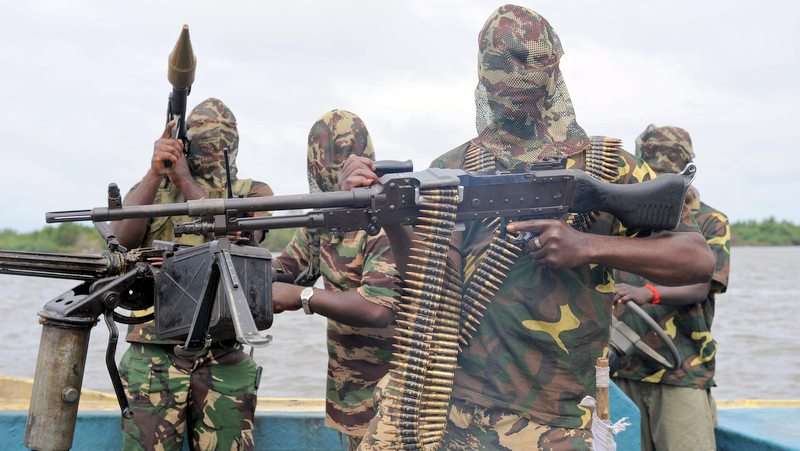- Niger Delta Agitators Suspend Planned Attacks on Oil Installations
Niger Delta agitators yesterday formally withdrew the quit notice it handed down to northerners and Yoruba to leave the oil rich region.
In a statement made available to The Guardian, the group also resolved to suspend the planned attacks on oil installations in the region and also set aside their intention to declare the republic of Niger Delta on October 1.
They also made peace with the Pan Niger Delta Forum (PANDEF), with whom they had disagreed over who negotiates with the Federal Government.
The coalition of the agitators, led by General John Duku, said that the quit notice withdrawal, amongst other threats, was sequel to the intervention of PANDEF and Nigeria Ethnic Nationality Youth Leaders Forum (NENYLF) led by its Acting National Chairman, Comrade Imoh Okoko.
Nevertheless, they demanded the removal of the current Group Managing Director (GMD), of the Nigerian National Petroleum Corporation (NNPC), Mr. Maikanti Baru from office.
Among signatories to the statement were General John Duku (Niger Delta Watchdogs and Convener, Coalition of Niger Delta Agitators); General Ekpo Ekpo (Niger Delta Volunteers); General Osarolor Nedam (Niger Delta Warriors); Major-Gen. Henry Okon Etete (Niger Delta Peoples Fighters); Major-Gen. Asukwo Henshaw; (Bakassi Freedom Fighters) and Major-Gen. Ibinabo Horsfall (Niger Delta Movement for Justice).
The statement reads inter alia: “After series of meetings yesterday between the high command of the Coalition of Niger Delta Agitators and the leadership of the Nigeria Ethnic Nationality Youth Leaders Forum (NENYLF), coupled with the intervention of Pan Niger Delta Forum (PANDEF), Coalition of Niger Delta Agitators, which comprises over 250 groups with their leaders and representatives present at yesterday’s meeting officially withdraw our quit notice issued to the Northerners and Yoruba living in Niger Delta region.’’
Meanwhile, the United Nations Development Programme (UNDP) said yesterday that it had successfully carried out an evaluation of soil sampling in two oil-spill impacted communities in Imo State.
The programme was conducted under an on-going community based intervention project, which seeks to cleanup and remediate hydrocarbon-impacted farmlands in the communities through sustainable bio-remedial and agro-forestry programmes.
A statement by the Coordinator of the UNDP/FYD bio-remediation programme, Ugo Amadioha, in Abuja, said that the soil sampling and analysis was conducted at Ogada and Etekwuru in Egbema Local Council of Imo State, as part of FYD’s community empowerment project.
Also, suspected illegal crude oil bunkerers have shot two soldiers in Rivers State.
The spokesman of 6 Division, Nigerian Army, Port Harcourt, Col. Aminu Iliyasu, disclosed yesterday that troops of 29 Battalion Tactical Headquarters, Bille, Rivers State encountered armed illegal bunkerers at Feropkakama, a notorious bunkering site, who on sighting troops opened fire.
“The gallant troops repelled the attack and pursued the scampering criminals deep into the creeks with many of them sustaining gun shot wounds.‘’
Unfortunately, two brave soldiers were wounded in action, one of them critically but both are responding positively to treatment at a military facility in Port Harcourt” he said.
Iliyasu also explained that in a follow-up operation, four empty AK 47 magazines, eight pumping machines and several other illegal bunkering tools while a massive manhunt in conjunction with other sister security agencies is under way to track down and arrest the fleeing criminals in order to bring them to justice.
He also disclosed that troops on routine anti-bunkering patrol to Elechi and Abonnema Wharf in Port Harcourt discovered and destroyed several quantities of suspected illegally refined oil.


 Forex2 weeks ago
Forex2 weeks ago


 Naira2 weeks ago
Naira2 weeks ago
 Naira4 weeks ago
Naira4 weeks ago
 Company News4 weeks ago
Company News4 weeks ago
 Billionaire Watch1 week ago
Billionaire Watch1 week ago




 Naira2 weeks ago
Naira2 weeks ago




 Naira4 weeks ago
Naira4 weeks ago




 Naira1 week ago
Naira1 week ago





















